Updates
This is a page for half-baked or brief blog posts that aren't interesting enough for the weblog but took up too much space or I wanted to be more permanent than a social-media post or a Now: update.
- Second-Degree Gaming
- My Regular-Sized Home Server
- Saving The Ovo
- How To Fix YouTube
- My Tiny Home Server
- The Best Books I Read in 2024
- Despotification
- You Should Hack Your 3DS
View List
08.17.25
Second-Degree Gaming
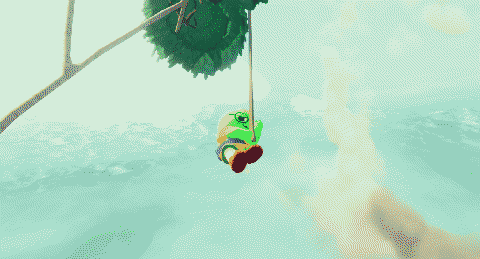
I used to be a big consumer of "Let's Play"-type videos, which were once the number-one variety of internet video. It's an appealing onramp for the aspiring content creator: cameras are expensive and OBS is free, they're better if you're funny or charming but it's certainly not required, sponsorships and Steam keys will rain upon even the meagerly-followed, and lastly, who doesn't want to play video games for a job?
I would say I aged out of the Let's Play audience sometime around 2018, and most of the guys whose riffing and hooting I enjoyed in high school have since moved on to other pursuits or been outed as dangerous perverts. But the Let's Play space has continued to fluorish without my hater ass around. As more viewers and money and influence accumulate, a sort of symbiosis has emerged: Game developers will make games people want to stream, and streamers will play them, exposing games with very little marketing budget to a vast audience of people who self-select for liking video games; exchanging exposure and digital sales for another few 45-minute videos to feed to the algorithm. It's not a bad deal.
For the last few months I've occasionally been jumping online with some friends to play PEAK, which you've already played or seen played. You are a gang of little cartoon castaways who must ascend miles and miles of procedural terrain rife with hazards, eventually (I have to assume) summiting the titular peak to find rescue.
This game is an ideal symbiote: Made by a midsize indie studio on a small budget, PEAK has moved five million copies as of a month ago, so probably more like six million at press time. It's cheap, simple to pick up, and at every turn comically cruel—not only is the swiss-cheese terrain tough to judge in first-person, benign-looking moss explodes into toxic miasmata[1]Googling "miasma plural" and wondering if I'm being pretentious., helpful items are hidden on prohibitive detours, weather conditions affect climbing speed or immobilize you completely.
This is a streaming game. And I don't use that term pejoratively! I think it's fun and I like playing it for 90 minutes at a time now and then. By "streaming game" I just mean to say that PEAK has exploded like so much toxic moss because it's equally—if not more—fun to watch than it is to play.
Video games used to have, essentially, an audience of one. Drop your quarter in the slot or push your cartridge into the console and you enter your own personal world, bordered by rules but created to entertain you, the player, the actor. Circa Y2K there was even a whole genre based on this principle called the "immersive sim," where offering the player the most elaborate, interactive world possible was the primary ludological thrust[2]Typing "primary ludological thrust" and knowing I'm being pretentious but adding this effacing footnote so it's OK..
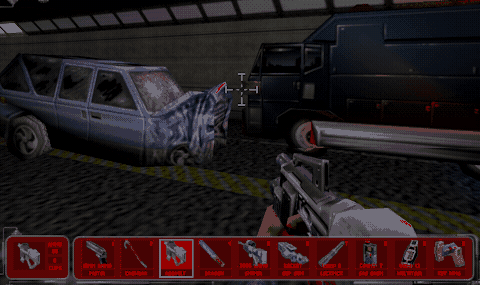
Deus Ex (Eidos Interactive, 2000), one such immersive sim . Screenshot: MobyGames
The way game designers design games has always responded to the world around them. That's inevitable about anything made by anyone. When CRT televisions were standard, video games ran like oscilloscopes, and you played as a line or a dot. Eventually the processing power existed for you to play as a character in an environment, then even a three-dimensional environment. Today, if you haven't heard, computers are really damn good—so good that a video game can look like anything you want: yarn, LEGOs, parchment, etcetera. It is my opinion that the era of "realistic graphics" being a main selling point is over, especially as big studios struggle to keep secret their treatment of the people who generate them.
Of course, the hardware they run on isn't the only tide pulling games one way or another. The market for video games and the tastes of the people buying them must, in our haunted world, also play a factor[3]My vision for video games after the socialist revolution is that every year one person will get chosen at random to direct one for 100 million dollars. Same thing for movies., meaning the rise of Let's Plays and livestreams has given second-degree users of the game a token of influence. And this is the major sea change in games in the last decade: A game designer hoping to achieve popular success must design their game not only for the player, but also for the experience of an imagined audience.
I need to make clear that I am not writing this post because I'm mad, don't put in the newspaper that I was mad, et cetera. PEAK is a wacky game where the bad stuff that happens to you is intentionally comedic, and I'm bad at any video game, so seeing your little pastel doughboy deplete their energy and tumble into a chasm is at least funny compared to the equally cinematic Dark Souls "YOU DIED."[4]Which, come to think of it, is also kind of funny in its abruptness. They recently added a new "Mesa" area, where random bundles of dynamite dot the landscape and ignite spontaneously when you walk by. Even considering the desert level takes about an hour of climbing to reach, throwing your controller at this is like getting mad that Wile E. Coyote never catches the road runner. That's the point!
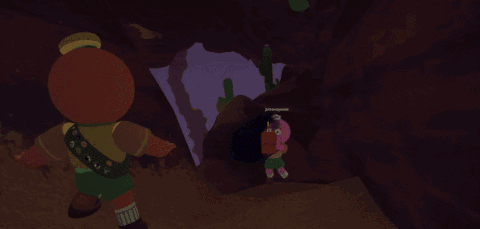
I'm surprised they didn't pair this with fake tunnels painted on the canyon wall . Footage: Aggro Crab
If I wanted to talk about "streamer bait," there are far more egregious examples to choose from; cheap jumpscare-fests built from pre-baked Unity assets and emailed directly to today's most relevant Shouting Guy (is it still Markiplier? I'm very old). This slapdash pablum[5]Okay, college. represents the bottom end of the balance between "fun to play" and "fun to watch," although I personally don't find them very fun to watch. It's a fake type of game with no artistic merit and no purpose besides pumping merch at Target. PEAK is original, fun, polished, and as far as I can tell, merchless (although, look at those guys. They're ripe for a plush).
I'm writing this post about PEAK because it sits roughly in the middle of the player/viewer satisfaction spectrum, which makes it more interesting to pick out what decisions are earmarked for which audience. When is a frustrating mechanic pointed at you and when is it using you to set up a funny performance for somebody else?
There have always been criteria where the player and a hypothetical audience align: both parties benefit from the game running smoothly, intuitive camera settings, easily-readable interfaces. And then there are areas where these two parties are opposed, such as complex worldbuilding (it's exciting when a game is fleshed-out and immersive, but somebody just virtually peeking over your shoulder will have no idea what's going on) or unfair difficulty (it's funny to watch somebody else screw up and lose). The "rage quit" genre has been an online staple for decades, produced with and without the consent of a subject who may or may not be hamming it up. To the extent that Twitch as a platform is about watching young men reduce their lifespans, this is just a minor example.
There is value to the primary player for a game to be funny[6]I can't find a good video of it but I'm thinking of in Portal 2 when you get the bouncy gel on a cube and it makes basketball noises., comically difficult, or even intentionally obtuse in a way that challenges definitions. Maybe the notion that video games should empower and serve the player is reductive to the art form. But one thing I am frequently thinking of is a line from the NBA 2K17 episode of Monster Factory where Justin asks, "Did they bench you in the game you bought?"
Proximity-based voice chat makes sense in a game about wandering the wilderness trying not to lose anyone. But being isolated from your fellow climbers opens an opportunity to confer with your Twitch chat instead, and the absence of anything like a findable walkie-talkie ensures those windows keep happening into the endgame, or for the duration of an hours-long stream. Random explosives along the path or deadly hazards posing as items are funny to the player the first time, but the barrage of the same pranks over and over feels designed to generate clippable moments of bewilderment. The anticlimax of finding some rare item like the "Scout Cannon" only to learn the hard way that it just severely injures you rather than assisting your climb is a punchline for the watchers, who have already seen it happen to some other streamer. The Twitch era has brought dramatic irony to video games for the first time.
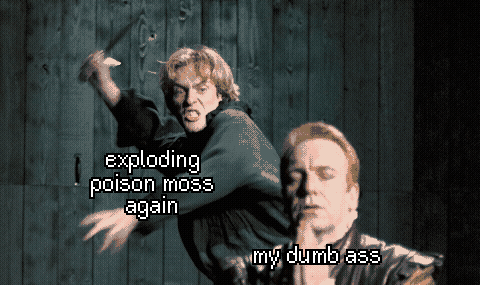
RIP William Shakespeare . You would have loved Five Nights At Freddy's . (Photo: RSC)
Maybe try and analyze the play/watch balance when you're trying out a new video game, and see if the watch portion is higher if you heard about it from a video of someone else. I submit that we can frame the dramatic-irony content of a game on a scale of artistic integrity, bottoming out at asset-flipped "streamer bait", rising through games aware of the peanut gallery but catering to them at less and less expense to the player, and peaking at a game that is a flawless first-person experience but is unwatchably boring if you aren't in control. Which means, by my count, that the greatest work of art in video games is 2009's Plants Vs. Zombies. Thanks.
06.23.25
My Regular-Sized Home Server

Not accepting comments about my cable management at present .
This has been a months-long project of building and configuring and troubleshooting, but my home server finally works the way I want, so I thought I'd write up my process so anyone else looking to build something similar can skip all the annoying parts and just copy my stack. Consider this kind of a "For Dummies" guide to setting up a cheap, low-maintenance, light-duty server that you don't have to mess with very often.
Hardware:
The server itself is a Dell Optiplex Micro that I scored refurbished for like $80. I'd bet you can find this exact computer or one like it for even less; offices are often liquidating these little PCs or sometimes straight-up throwing them away in bulk. This one is from a refurbisher on eBay, and I cheaped out a little on the RAM and SSD because I knew I wasn't going to be stressing it very hard.
You can turn basically any computer—including a junker laptop or a Raspberry Pi—into a home server, unless you're planning to do some really power-intensive stuff like video transcoding, which I am not. I would recommend something with an Ethernet port so you can wire it to your router, just because asking the server for something over Wi-Fi and then getting it back over Wi-Fi takes up twice the bandwidth.
The hard drive is a Seagate USB Expansion that I picked up on sale (it appears to still be on clearance). If you're really serious about Deals, diskprices dot com is a beautifully bare-bones website that tracks dollars-per-terabyte from a bunch of sellers.
A lot of homelab guys will tell you that USB is unreliable or too slow, but my philosophy is that if I can just plug it in and it works then that's fine. I know I could have shucked it and bought a $10 cable and wired it directly to the motherboard, but frankly an oaf like myself cracking open a computer case is probably going to cause more problems than it solves. I did find this guy on a forum going nuts with SATA adapters if you want to use a Dell for a much beefier dedicated storage rack.
The DVD drive is just some cheapo DVD drive also from eBay. I was, for a while, using one I salvaged from a laptop somebody in my apartment building threw away, but that one wasn't balanced to work outside of a laptop so it was making a weird grinding sound I didn't like. Honestly I am not ripping a lot of DVDs but I keep the drive over there when I don't need it at my desk.

Here's basically how it all works .
Software:
The Dell box came with Windows 10 on it and for a while I just left that on there and used Teamviewer to log in and do stuff. That worked fine when all I was doing was running a Minecraft server and network-sharing the hard drive, but when I tried to install Docker I found out that the home edition of Windows 10 doesn't allow you to run virtual machines.
So then for a while I attempted to use Ubuntu Server and do everything over command-line. My advice: Do not do this. I boinked things up so bad that I had to do a full reinstall twice. To me, the marginal power savings you gain with a skeletal OS like Ubuntu Server are not worth the headache of trying to troubleshoot it over SSH with nothing to look at. If you're a PuTTY professional who can mentally visualize file trees, then godspeed, but I don't know what you're reading this page for.
I switched to Ubuntu Desktop, which I have found to be pretty usable, and then I graduated to trying to install Docker Desktop for a while. Docker is widely praised by nerds for being smooth to use and easy to manage. This was not my experience. It mostly worked, but my end goal was to install Immich (a self-hosted Google Photos copycat) and even after weeks of research and an hours-long Discord call with two people much better at Linux than myself, I could not get the Docker container to put the photos on the external drive. I still don't really understand "containerization" or how a "volume" is different from a folder.
So I abandoned Docker and installed Runtipi, which is either a fork of Docker or a Dockerlike platform that gives you a built-in app store and clickable buttons. Runtipi kicks ass. If you are a computer dunce like myself I can't recommend it enough. You run one command to install it, it sets up a web dashboard you can log into from your main computer, and everything after that can be done with minimal typing.
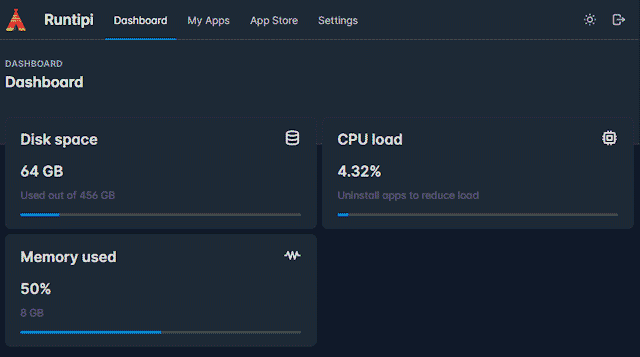
This is another area where I'm sacrificing some customizability in exchange for just having the thing work when I plug it in, and another area where I'm totally okay with that tradeoff. You can install Immich as a Tipi app in two clicks and there's zero additional messing around (aside from editing the settings file once). Now I have twelve terabytes of room for photos on my own hardware and I will never, ever pay Google three dollars a month.
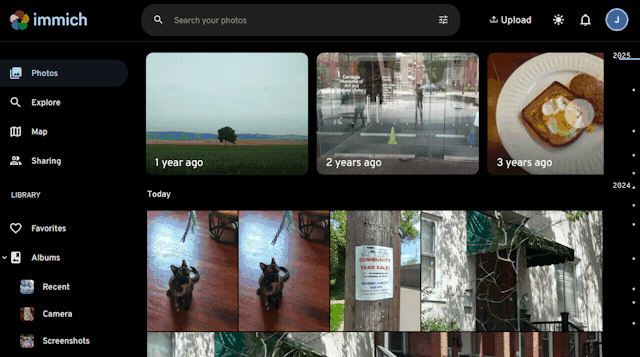
It was so sick to spin this up and see "1.6TB of 12TB used" after literally weeks of trying to get Docker to even notice that the 12TB drive was there .
Immich also has a phone app, and is shockingly feature-complete for being developed by one guy. You can pair it with Tailscale (another goated Just Install And It Works piece of software) to back up photos from your phone when you're away. Once I gave up on Docker, the most annoying part of the process was downloading and unpacking all my Google photos, but there is probably a way to automate that too.
The other Tipi app I have running is a Minecraft server—there's a prebuilt server package on the app store. To make the server public you have to get into your router settings and open the port, but there are hundreds of tutorials written by children on this topic. Deploying a Minecraft server with Tipi is actually even easier than it is on a Windows machine.
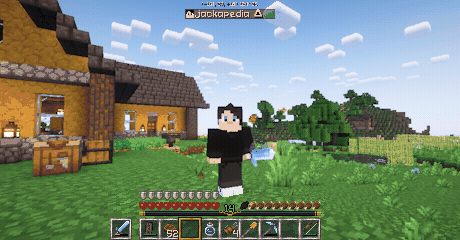
You can join my Discord if you want to craft with us .
Runtipi sort of runs "outside" the regular OS. It creates a folder you can open to edit various settings, but it's not visible on the desktop; everything is managed through the web dashboard. There is a convoluted way you can use any Docker image in Tipi by making your own app store with GitHub, and I attempted to do this with a Soulseek client, but I couldn't figure it out.
So I'm just running Nicotine+ on the regular desktop, and using XRDP to leave it on when I'm not logged in. (Ubuntu's built-in remote desktop puts the computer to sleep on disconnect, which means anything you have running on the desktop halts. XRDP has a setting to keep the session open even when you're not looking.) Both of these programs I would also put in the J.I.A.I.W. category, and I also think this is an advantage of Ubuntu Desktop over the server edition: if there isn't a containerized version of an app you want, you can just install it normal-style and let it run.
The very last thing I have installed is Samba, which I also use on my Raspberry Pi music server. Samba is as simple as NAS software gets: you just name a folder and it makes that folder into a network share. It does take a little command-line setup, but once it's running it'll just run forever. I have one Samba share pointed at the Seagate drive, so I can put movies / TV / work stuff on there and also access photos natively that I uploaded to Immich. The other share is the folder with the Minecraft server stuff in it, so I can mess with those remotely, which is a trick that made me feel like a real Cyber Genius when I thought of it.

UPDATE (7.29.25): I have just now learned about Copyparty, an incredibly capable and flexible filesharing program that you install by running one Python script. So I'm using Samba to access things locally and this to access them from elsewhere. With a Cloudflare tunnel, which you can have like a hundred of on their free plan, I can also use Copyparty to share files online from my own domain. (don't tell anybody, OK?)
Next Steps:
- One thing I do think would be good is buying a backup power supply for the Dell / hard drive / router, because whenever the power goes out I get worried something will get corrupted. So far that hasn't happened, except that Ubuntu mounted the hard drive under a different name on restart and I had to change some file paths because I couldn't rename it back (???). Again, this is a goofus's guide to home computing.
- I would like to find a way to render Sony Vegas projects on the server and save my laptop the brunt, but my best guess at how to do this was to just install a cracked copy of Vegas 14 and I couldn't find one that worked.
- I think it would be cool to have the server automatically rip CDs and DVDs to the hard drive. This guy has built a script that seems to be exactly what I want, but it's only available as a Docker image and the native install version is no longer supported. I am trying to set it up anyway as I write this but I don't know if it'll work.
- I know most people who get into homelab stuff are heavy Plex users. I have some movies and stuff on the NAS, but the current method for watching them (using VLC to either play stuff locally or cast it to the TV) works just fine, and honestly setting up a whole torrent node or whatever seems like major overkill to occasionally watch Mythbusters in 360p.
Anyway, I guess the point is that if you want to self-host some stuff you do not need to spend $5000 on rack equipment or remodel your garage or anything. Altogether I spent a little shy of 300 dollars on this rig, it fits under a side table, and it should do everything I need for a long time—if anything, I'm tempted to push it a little harder. And if you skip all my mistakes and go with the "Just Works" options you can have it running inside of a weekend.
05.20.25
Saving The Ovo
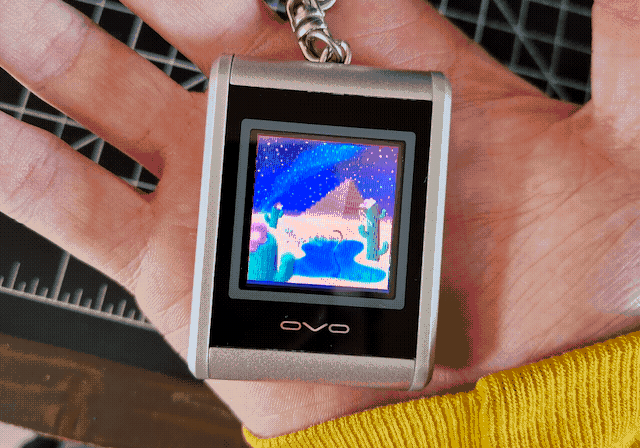
I am a sucker for an obsolete device. I love my terrible ActionShot camera. I love my 2DS XL. I love saving some little gadget from being thrown away just because a newer product has filled its niche. Honestly, I love stuff that is kind of cheap and kitschy. So when I find one of those photo-frame keychains I always grab it.
This is a genre of device that feels so quaint to me because it occupies a really narrow stratum of electronics history: after flash memory and color LCDs got cheap, but a time when digital photos were still precious. They are fairly common at thrift stores, almost always still sealed in the box, probably because they were bought firsthand as a Mother's Day present and then the iPhone came out before Mom got around to setting it up.
This specific model is called "OVO Digital Photo Viewer." I can't find a model number more specific than that because they made a ton of different ones that I'd bet are all the same board & firmware in different shells.
I got this one brand-new in the box, and it came with driver software on the smallest CD I've ever seen (it's about half an inch smaller than a GameCube disc). Sadly, I didn't have an optical drive handy at the time, so I put it all in a drawer and figured I would get to it later. "Later" ended up being last night when I realized I do have an external CD drive now.
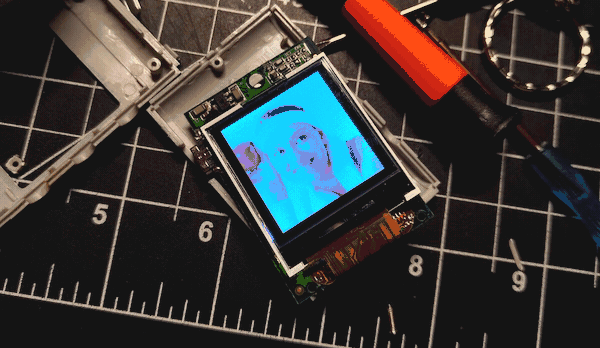
I tried to find some way to save these goofy stock photos but I couldn't figure it out . Miraculously, the 20-year-old battery is still charging and working just fine .
First I tried just opening the CD on my regular Windows 10 laptop. It installed a program for moving files onto the device, but when I attached the keychain it didn't recognize it as a storage device. Poking around on the CD I found that it only contained drivers for Windows Vista that did not seem to work on my laptop at all. So I reinstalled VirtualBox and spun up a Vista machine, passed the USB port through, and installed the software & drivers on that. Not to sound like a 16-year-old with a Frutiger Aero Tumblr, but Windows Vista was kind of beautiful. Screens have been good enough for long enough that operating systems have moved past trying to dazzle you. I guess it's the same thing that killed off the photo keychain.
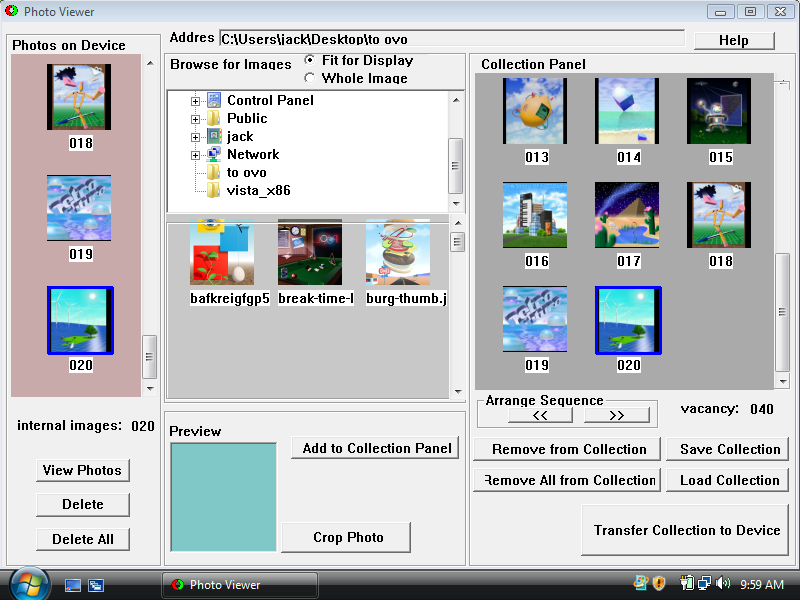
Now this is software, baby .
Anyway, I spent a little while figuring out how to move files from my real computer onto a virtual computer (VBox's "shared folder" and "clipboard transfer" stuff did not work, or I am a dummy who didn't use them right). I know how to attach USB devices, and I have a flash drive, but my flash drive is USB 3.0 and is apparently too advanced for a Vista machine to notice it.
I ended up burning the JPEGs onto the disc that came with the drivers, mounting the CD drive again, moving them to the VM's desktop, then reattaching the keychain. Very stupid way to do it, but it works. It works!
UPDATE (July 2025): I went ahead and uploaded the software from the tiny disc to archive.org, in case you find one of these thrifting and it's not in the box. Also I realized I can access my NAS on the virtual machine, so I don't have to do the stupid leap-frog anymore.
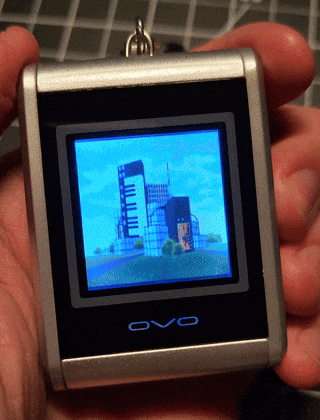
I promise it looks a lot less blue in real life than it does on camera .
Now I have a really funny way to carry my portfolio around, I got to do a pointless little project, and I saved this guy from becoming e-waste. That's pretty much a hat trick for me.
02.15.25
How To Fix YouTube: An Impossible Plan
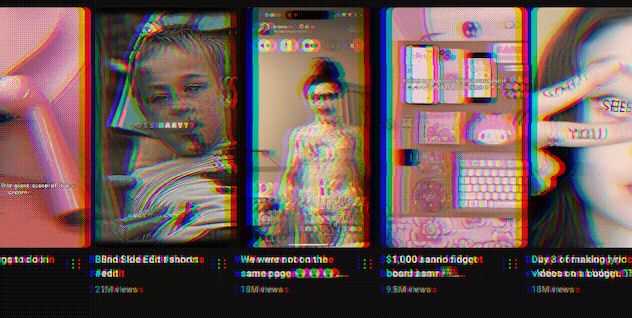
YouTube turned 20 years old yesterday, and unfortunately that link disputes the next thing I was going to say, which is that it was originally engineered because a handful of PayPal programmers wanted to look at Janet Jackson's nipple. I will be continuing to believe that story, personally.
Like all corprate websites, YouTube is currently a huge and ever-expanding ocean of worthless garbage that it's possible but harder every day to have a nice time on. As the social-media platform where "the algorithm" is maybe the most in control of a video's impact—and, as uploading videos shifted from a hobby to an industry, a video's creator's livelihood—YouTube is also the platform where the practice of tricking or baiting the computer and the humans on the other side of it is the most transparent.
YouTube has management and culture problems, of course: a joke of a copyright enforcement system, grating and constant advertising, a tendency to radicalize high-school boys into mass murderers. In 2025 it is barely usable with a whole suite of third-party software between you and the raw website, and even then I find myself opening a YouTube tab, scrolling the homepage for five minutes, and then closing it without watching anything more often than not.
I think a lot, and have written a lot, about just how soul-eroding and bleak the modern Internet is to use. Firing up YouTube on a logged-out device is a great way to feel utterly alienated from humanity: you will be greeted by scoop after scoop of blaring, artless, vapid goo that you can't fathom ever volunteering to watch; and yet the website claims that millions of people worldwide volunteer to watch it every single day. I know I'm a hater and a jerk and don't like anything, but it boggles the mind to imagine an eight-figure number of beings just as human as yourself burning some amount of their finite time on Earth watching an AI-narrated slideshow rehashing a movie from ten years ago as if it really happened.
I think the main thing that aggravates me about this kind of "content" is that it's in a whole different class from just something bad. I can watch something and decide I don't like it, but still respect and appreciate it as being made by a human being in service of an idea. There's loads of bad art, and if you tilt yourself against bad art you're going to lose. There's not even anything wrong with an amusing, pointless diversion: God knows we need to be diverted sometimes. The thing I can't stand is content: something a person may have technically made but which they don't care about in substance; something designed to maximize engagement at the cost of its soul. Video slop insults me the same way AI-generated "art" does. I'm supposed to respect something you didn't think was worth your time to make?
"Ninety percent of everything has always been bad."
– Harris Bomberguy
This v21 post about the concept of "content" has really injected itself into my view of the attention economy. They posit that modern online content is not necessarily meaningless, but rather that the presence of meaning is a non-factor; like Harry Frankfurt's definition of 'bullshit', "content" is a void-fill product where sheer volume is the only quality that matters about it. What Frankfurt tells us is that this nihilism re:value makes the bullshitter more dangerous than the liar, who at least cares about the truth enough to reject it. We can draw a parallel line here between even the least talented or interesting creator of art and the creators of content—the former is at least trying to express something; the latter, only looking to produce something.
The ability to share video—a tremendously capable, vital art medium—in a venue as vast and volatile as the internet is a great idea, and it has of course resulted in some great creative works in the last 20 years. I don't mean to accuse everyone who uploads video to YouTube of being a soulless grifter. There is good and worthwhile work hidden in there; it's just increasingly tough to find these needles in the massive haystack of slop. To me, every major website now requires you to build your own micro-network within it and then navigate those little connections very carefully lest you (or something you post, in the case of Bluesky/Twitter) fall overboard and join the churning slop below.
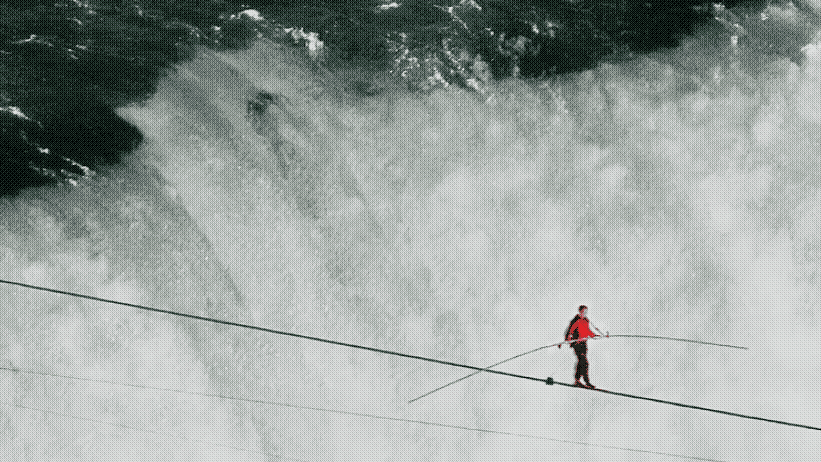
I really like Ted Chiang's definition of art as "something that results from making lots of decisions." I would argue that by this definition there is no overlap between art and content: if we define content as value-optional work made to maximize statistical performance, then even the most technically-complex content is designed to suit the whims of an algorithm, and therefore the choices that go into it have been predetermined by the computer, not the person. Ubiquitous is the online artist forced to dilute their vision to pander to the algorithm, or even forced to wreck their artistic process with marketing, devoting more and more time to lifestyle-focused TikToks and less and less time to the actual creation of their art. Viciously, the modern slop economy actually penalizes you for hanging on to any shred of creative integrity: someone looking to express an idea in a thoughtful way has given themselves a ton of labor to do, in which time they will inevitably get lapped by somebody who can roll a hundred jars of Orbeez down the stairs in a day. Individuals who use online video to express interesting or important ideas still survive, and have built audiences that can support them despite infrequent output, but picture someone wholly new to a platform like YouTube trying to figure out what's good on there by checking out the most looked-at videos. Without the outside help of a human friend, how would this user ever find anything memorable beneath the constant spew of filler?
"'Amusing' will always defeat 'beautiful'. All that remains is popularity - a status achieved by being rich, attractive, a panderer, or all three."
— Zach Weiner
Because a computer only understands numbers, the website only cares about statistics, and better statistics are built by maximizing your output. Whether something is good or deserves to exist on its own does not matter compared to the simple binary of whether it occupies space and can therefore be attached to advertising. This incentivizes and cultivates the kind of pointless, uninteresting, paper-thin slop that can be easily produced in industrial quantities: mutated clips from TV shows, AI voices reading Reddit posts, unnervingly-horny-but-not-technically-explicit material, all manner of toxic attention-hijacking that boils down to someone jingling digital keys in front of your face. The fact that everyone who spent their adolescence online has a pathologically withered attention span isn't a generational problem: it's the intended result of YouTube (and Google and Meta and Twitter and TikTok et al.) strategy to manufacture a better breed of consumers.
This is my impossible pitch to fix YouTube, my day-one move if I was suddenly placed in charge of the whole operation: Remove all the money. Eliminate all advertising except for the minumum required to keep the lights on. Shut down the industry and the incentives and make it what it was meant to be: a free place to post a video and share it with no expectation of a monetary return. (After it was meant to be a place to look at Janet Jackson's nipple, I mean.)
This is a cruel and spiteful idea that would wreck a lot of careers and impoverish a lot of young artists. I admit that. But my main motivation is to make quality no longer optional. How many people would choose to spend their time cropping Big Bang Theory clips if there was no payout? If the choice whether to post something was returned to the human, rather than imposed on them by a machine, then the only reason to post something would be a belief that it deserves on its own merits to exist. I think there would still be tons and tons of lazy, bewildering, bad stuff to look at. But it would at least exist on purpose.
01.30.25
My Tiny Home Server

Maybe two years ago I bought a Raspberry Pi Zero with the intention of using it to run Pi-Hole, which if you're not familiar is a system for intercepting and eliminating ads from all traffic on your home network. I think Pi-Hole is a great idea, and it's pretty popular with people who do a little bit of tinkering. Unfortunately, it's not capable of the one ultra-specific thing I bought it for, which is to kill YouTube ads on the Nintendo Switch client so my partner could watch Let's Plays on the couch in peace.
(This isn't Pi-Hole's fault; YouTube ads and videos come from the same server so there's no DNS-based way to filter one and not the other, which I should have looked up before I did all that work. I still don't know how to kill ads on the Switch—let me know if you do, short of paying money for YouTube, which I will never do.)
Anyway, that means I've had a Rasperry Pi—a pretty cabaple, amusingly tiny computer—just sitting around not doing anything for a while. I've also been thinking more and more about setting up a NAS (network-attached storage) in my apartment, as my hard drive gradually fills up with locally-stored music.
The Raspberry Pi can be set up to run "headless," which means you can control it from another computer without needing an extra mouse/keyboard/monitor. Once that's all done, you can order it to install a program called Samba that turns it (and whatever storage you attach) into a network drive discoverable by Windows. Once you have the Pi formatted and connected to your wifi it's a pretty rewarding process, if you judge that by the ratio of "number of command prompts you have to type" over "how much text you get to watch scroll by and feel like a cool hacker."

Is the Pi Zero a good NAS? No; it's a 128-gig SD card in a $10 computer with the kind of wifi bandwidth a $10 computer has. Also it keeps going down randomly and then I have to unplug it and assign a new address. My original intent was to set it up as a music server I could stream from my (nearby) laptop over network and my (far away, sometimes) phone using port-forwarding; given the pretty weak and unreliable specs I don't know if that'll even work.
(Update: After a while trying to load music onto this thing while resetting it every 45 minutes because of the same error, I figured out what the issue was. Go here if this happens to you, although I hope it just works fine.)
However, the Pi/Samba NAS does have three key redeeming qualities:
- 1. It's more useful than it was sitting in a drawer unused, and I like keeping my devices useful.
- 2. It's pretty good for some hardware I already had on hand without buying anything.
- 3. It's cute.
(I am thinking of setting up a real home server—or, more likely, a general-purpose mini-PC that could serve as a NAS and a media box hooked up to the TV—at a future time when I have 200 to 500 dollars laying around.)
01.03.25
The Best Books I Read in 2024
I wrote that header as "My Favorite Books of 2024" on first pass and then after I spent a minute thinking about it I realized only one of them was actually published this year. So this is the best of the stuff I got around to in 2024.

Anvil of Stars by Greg Bear
Greg Bear rocks. The Forge of God, the book before Anvil, is the first book I finished in 2024. It's really great—a premise that's probably been done plenty (a tiny, random sample of humanity escaping the destruction of the Earth) executed with expert pacing and an overall atmosphere that, being written about the near future in 1987, is only a little dated in a charming way. In Anvil of Stars we get to see the next generation deal with the aftermath: a young crew traversing deep space in a vessel provided by benevolent but mysterious aliens who claim that their mission is to help the survivors of destroyed planets seek revenge but insist that a human must pull the trigger when the time comes. This book is like one of those French sandwiches that's just ham and butter: the two simple ingredients of great scifi (human, relatable characters in an imaginative, engaging situation) in the highest quality you can get 'em. If I have one note it's that the ending is a little more clean-cut than I wanted, but this is still one of the works of fiction I've thought about the most after finishing. Huge recommend on this book specifically and also basically any Greg Bear novel you can find.

Water, Wasted by Alex Branson
In an era where every novel and movie and high-budget TV show has to be about trauma and grief, Water, Wasted is the first thing I've seen usefully explore the contradiction and confusion of it. Set in rural Missouri, the book takes its time walking you around, introducing you to people and their little tics and routines. It's such an empathetic and real telling of the rural experience that I was almost sad when the setup was finished and the plot started happening. That plot is that the accidental death of a high-school boy sends his girlfriend into social exile, and the couple who look after her are forced to relitigate the death of their own daughter, finally reading the amateur fantasy novels she was working on in life. Elements of the fantasy world begin to seep through the cracks into reality, which sounds very silly written out but unfolds in a way that is genuinely compelling. Nested layers of fiction slowly merge until the traditional novel structure crashes down. If you like ambiguity and open-endedness, a resource getting scarcer all the time, pick this one up. I can't praise enough the chapters of fantasy excerpts, which are genuinely so goofy and charming that I would gladly buy a full copy.

You, Me, & Ulysses S. Grant by Brad Neely
I don't think I could name another book that I've laughed out loud while reading, but You, Me, & Ulysses S. Grant had me honest-to-God cracking up so often that my girlfriend eventually quit even asking what it was about. Written in character as a deranged amateur historian, the book focuses on the life of U.S. Grant from his childhood through the end of the Civil War. It's also a critique of the concept of biography, inventing so much gap-filler and speculation that it strains the label “non-fiction”—but, arguably, only as much as any book claiming to reveal the inner motives of someone long-dead. Neely is just more transparent about the parts he made up—inventing insane dialogue, hypothesizing about how bad it would suck to hike across Panama in the 1850s, making the conflict between Grant and Robert E. Lee deeply personal rather than just political. Speaking of Lee: unlike many Civil War accounts and biographies, Neely treats the backward attitudes of the 19th century and the evil motives of the Confederacy with the correct (total) amount of ridicule and scorn, something sorely lacking in “real” history books on this era. His prose is frequently over-the-top and overwrought on purpose but also manages to be beautiful and transportative in passages describing the horrors of Shiloh or the bizarre character of Abe Lincoln. This might very well be my favorite book I read all year.
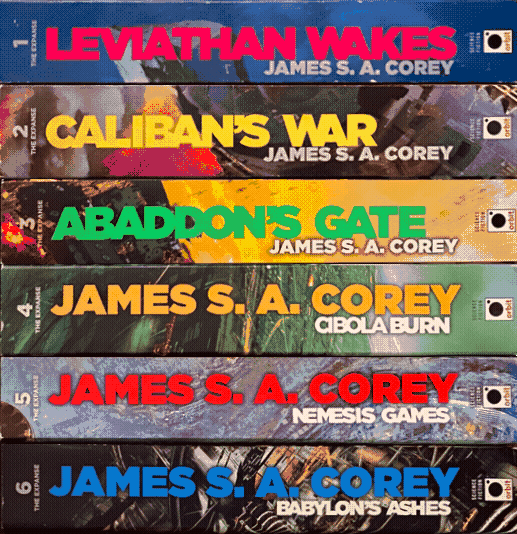
The Expanse series by James S.A. Corey
I really liked the Expanse TV show (the first couple episodes are corny but it gets good later on) and for years while it was running I would see these at the bookstore, pick one up and consider it, then decide I just didn't have room in my life to commit to a series of huge-ass paperbacks. Then I got an ereader and books no longer have mass or volume, so I spent most of this year just absolutely ripping through the series. It's great. There's like 5,000 pages total and almost zero filler. The world they (it's two guys) establish feels so real and dangerous and sprawling, and then more than once everything about it gets flipped over. There are some quirks—it's weird how every time somebody new meets Bobbie Draper there's at least once sentence about how hot / intimidating / Polynesian she is—but the big-picture narrative rhythm is unbeatable. It's kind of true that Jim Holden is a protagonist built out of Principles in an almost mythical way (toward the end of Cibola Burn when he refuses to just take out the evil and insane security guy because he believes in the power of courts or whatever I think you're kind of meant to roll your eyes) but I think this is the only way the rest of the thing works: Holden, the crew, and the Rocinante are a stationary vantage point from which you can watch the rest of human civilization shift and evolve. I plowed through the first six books between about July and September, took a break, and then slammed the last three (which are almost their own trilogy because of how far the scope has shifted) between November and New Year's.
Yes, the Expanse is about big and important questions concerning the future of humanity and its inherent flaws, and the dueling existential horrors of highly-advanced alien technology and spacebound capitalism. It handles these questions with idealistic but serious consideration, and I'd like to believe in its conclusions. It's also just a total blast as a piece of writing: everything that happens is important, every character is unique, every side of the conflict and conseqence of its unfolding is thought of. Like a good spaceship, it's wickedly fast and totally airtight.

Strange Disappearances by Brad Steiger
I have a little collection shelf of paranormal literature: almost all UFO and alien-abduction stuff from the 60s through the 90s. Most of them I have read or attempted to read. None of them brought me as much joy as this one. Strange Disappearances is basically a book of newspaper clippings about weird stuff happening separated by completely baseless “explanations” through which the author attempts to pitch a theory that sometimes people or cars or Bermuda Triangle-bound airplanes fall through a hole to another dimension and disappear from ours. Of course Mr. Steiger also wraps in flying saucers, Bigfoot, whatever else you want from the grab-bag of goofy beliefs; he attributes the epidemic of people's windows cracking in 1950s Washington to some extradimensional creatures basically shooting spitballs at cars for fun. I can't stress enough how delightful this book is in its writing style and complete disregard for facts.
Some Honorable Mentions:
Morphotrophic by Greg Egan
The Three-Body Problem & The Dark Forest by Cixin Liu
Project Hail Mary by Andy Weir
The Descent by Jeff Long
12.12.24
Despotification
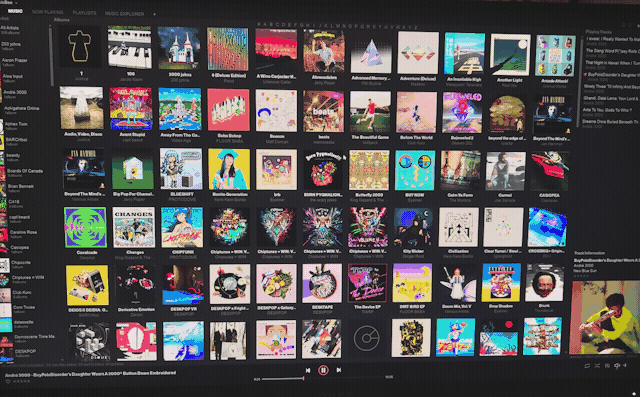
Thanks to homie cones for coining the term, or at least being the person I first heard it from .
Yesterday I canceled my premium Spotify subscription, which I had for a little over four years. Spotify is ubiquitous and universal for good reasons: the app is, or was, really easy to use and had just about anything you could think of. Their focus on playlists and “release radar” and the social aspect of music listening was a good idea (or is still a good idea, I don't mean to talk about an app like I'm at its funeral).
Like all apps, the company behind Spotify has done a bunch of evil shit. Most famously, their payout rate for musicians is basically nil, which has been the main argument against using it since almost day one. Its founder has invested undisclosed millions—statistically including a few of your dollars—in an AI firm that licenses its software to militaries.
But you don't need me to tell you Spotify is bad. It's worth billions of dollars, of course it's bad. I would love to tell you I stopped paying for it entirely because of the dinky payouts or the defense contracting. But while those are big factors, the thing that pushed me over the edge is that it's just annoying now.
Their annual “Wrapped” thing for 2024 (my top artist was allegedly FM Skyline, by the way) was bare-bones at best—I appreciate them dropping the “you ate the assignment this year, no cap” copy style but everything else about it stinks of “we laid off all the data guys six weeks ago.” Instead they pushed everyone an AI-generated “podcast“ where (I guess, I will never listen to it) a gratingly-cheery fake voice tells you what songs you like. Everything generative AI touches immediately takes on, for me, the sheen of creative bankruptcy. I've already been fastidiously avoiding tapping on the "AI DJ" icon for months, while also dodging sponsored recommendations, inline video content, and a general UI experience that resembles 2018-era Snapchat more every day. People who make an app that's installed on a critical mass of phones love to forget what their app is actually for.
There is stuff I will miss about Spotify, most of it playlist-related: making them seasonally, sharing them, etc. But I also think Spotify did a lot to shave down the minimum unit of music from the album to the song to, in the age of TikTok, the ten-second highlight. MusicBee does playlists and does let you shuffle your whole library, but I find something satisfying about seeing a big page of album covers, picking one, and just listening to the whole thing. It feels like I'm rebuilding my online-addled attention span.
And speaking of the age of TikTok, I'm increasingly sick of letting a computer decide what I should like, especially when that computer has a vested interest in funneling me toward the most popular and profitable stuff it has. Maybe just ask your friends what they're into.
Now I'm gonna talk about my new setup, with links to all the (free!) software so you can do this too, if you feel inclined.
Bandcamp is huge, obviously. I figure if I was paying $12 a month for Spotify and Bandcamp Friday (when the website waives their usual sales cut) rolls around every 3 or 4 months then I can afford to drop 50 to 60 bones every time and still break even, except that now 100% of my money will go to the artists I listen to instead of 0.002%.
Merch Table is one of the best websites I've ever seen: paste in the URL of a Spotify playlist and it'll find the songs on Bandcamp and give you links to purchase them. I actually made a bespoke "Moving Out" playlist, threw a bunch of my likes on it, and ended up with hits on like 90 percent of them.
Nicotine+ is a frontend for Soulseek, which is a peer-to-peer filesharing network (like Napster but nice). It basically lets you search for and download music from thousands of people's hard drives around the world, and share what you have on yours. I should note that getting all your music this way is the only way to benefit artists less than Spotify. I'm only using Soulseek to download music I already own physically or by deceased artists.
MusicBee is the player I've moved to. It's, if anything, a little too feature-complete, and kind of dense with menus and options compared to Spotify's dead-simple UI. But you can install custom skins and really customize the hell out of it in general.
mp3tag is a super-capable little program for editing metadata on audio files so they all have the right tags and album art and stuff. MusicBee lets you do a lot of that too but this is lighter and less confusing.
MusicBee doesn't have an official mobile app as far as I can tell, so on my phone I'm just using VLC Media Player. MusicBee does have some way to sync your library across devices, but I haven't gotten too deep into that yet, so I'm just copying the files onto my phone the old-fashioned way. Might go ahead and buy a dedicated mp3 player once my storage fills up.
UPDATE (July 2025): VLC was giving me some problems so I have switched to Poweramp for phone listening. It is six dollars but you just buy it once instead of subscribing indefinitely, and I like it a lot.
Anyway. I know that ditching Spotify is kind of the veganism of music, and I promise not to be annoying about it. I've given you everything you need to make the jump, and now I'll shut up.
12.07.24
You Should Hack Your 3DS
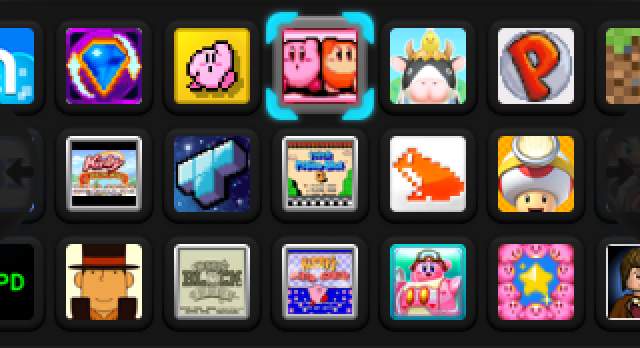
I don't know who this post is really for, because it seems like almost everyone who still owns a 3DS has modded it by now. But if you have one sitting in a closet since the eShop shut down, I am urging you to spend the 40 minutes it takes to install custom firmware.
I know the word "firmware" makes this sound like I'm asking you to switch to Linux or root your phone or whatever, but I was genuinely amazed by how easy and straightforward it is. The first step is the only mildly tricky part, and everything after that is just downloading files to an SD card. There's a clear, concise and complete website guide to the whole process that you just have to follow step-by-step, and even though they warn you that there's a non-zero chance of bricking it's pretty safe if you keep backups.
Once you have your system running custom firmware you can install homebrew games & apps to the home menu. You can rip any physical cartridges you have, including save data. You can sideload ROMs off the SD card. You can (this made me do a full evil laugh when I realized it's possible) use the 3DS's WiFi connection to put files on it over FTP without even touching it.

I think most of the thrill I've derived from this process comes from knowing it's the result of a dedicated community working really hard for years on software that's all totally free. It's the kind of love-of-the-game stuff you just don't see in a lot of spaces, especially spaces where it's possible to monetize at all. I don't know anything about real programming, far less writing raw assembly for a device not designed to let you do that. But lots of people just enjoy the challenge. The Homebrew Launcher is full of tech-demo type stuff (a pi calculator, an MP4 decoder) that seem to have just been made to prove their possibility, the same way people make crazy demos for other old consoles. And they're all generous enough to let unskilled chumps like myself use their work to improve my life. My 2DSXL was a paperweight before I decided to pull the trigger on CFW and now I've got a new battery on the way and will probably keep it around for years.
This specific project intersects with my personal principles pretty heavily. For one, I am trying to look at my phone less by replacing it with other, nicer screens. A choice between spending a bus ride scrolling through posts designed to make me go insane and spending a bus ride playing Peggle: Dual Shot is pretty easy.
Second, I love to rescue a device from getting thrown away. Even if the device isn't very sleek or powerful by current standards, if it works, why chuck it? And if it can become useful again by being modified beyond the original manufacturer's intent, the original manufacturer can eat it, in my opinion. A company wanting you to buy their new thing doesn't mean you're required to throw the old thing away just because it lacks “official support.” Why whould you give up (there are loads of emulators a jailbroken 3DS can run) hundreds of games that'll never be legally available again?
“Videogames are built on, and kept alive by, acts of crime.”
— myfriendpokey
© 2025 Jack Grimes. Made by human labor.